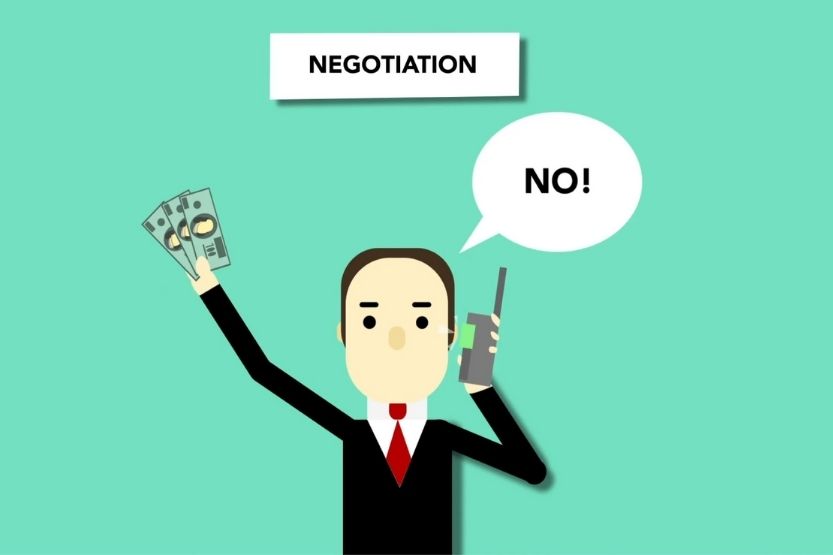It is an exciting moment when getting a job offer for a job you really want. If you just got an offer for a job, congratulations are in order, but what should you do next? How to respond to a job offer?
You can respond to a job offer in three ways – accept, negotiate, or decline. Whatever your choice might be, it is best to respond as soon as possible. You may also ask your potential employer for a day or two to think about your options.
Read on to learn more about how to respond to a job offer by email, in-person, or over the phone.
How to Respond to a Job Offer?

If you received a job offer, you might feel a whole mess of emotions surging through you, and most of what you are probably feeling include fear and anxiety. It is mainly because you don’t know how to respond to a job offer email. Relax, you already got the job anyway. Now, accept the offer and do so in a gracious manner.
If you are entirely new to this kind of setup, here are the typical steps on how you can respond to a job offer professionally:
- Step 1 – Think of a good response (use a professional format).
- Step 2 – Negotiate the terms of your employment (optional).
- Step 3 – Accept or decline the offer.
1. Consider Your Response
Immediately after receiving a job offer, you will need to think about how you will respond to it. There are three routes available: accept, negotiate, or decline the offer.
However, regardless of what option you choose, you need to send your response as quickly as possible. In case you want to negotiate your contract, ask the possible future employer for a day or two to consider your options.
Before choosing a response, consider your financial situation, the duties you will need to do, and your overall interest in the job. Also, assess if you feel comfortable with the company culture.
2. Negotiate (Optional)
If you want, you can choose to negotiate the terms of your employment with your potential employer. Before you do so, do a bit of research on the average market salary for the position. It’s also important to note the cost of living in your area of residence, your experience (if any), educational attainment, and skill level to come up with a fair salary.
If you will be negotiating in person, prepare your talking points well in advance and consider testing your negotiating skills with a friend. Suppose you will be replying in writing, state that you are interested in the position and would like an increase in the starting salary. Use the information you gathered to make a convincing argument but do so politely and professionally.
3. Accepting or Declining the Job Offer
Once you made up your mind and you have decided to accept the job offer formally or respectfully decline, you need to respond as soon as possible. You can send your response via snail mail if you want.
However, if the employer sent you the job offer via email, it would only be proper if you responded in the same manner. If you have to respond in person, the steps on responding to a verbal job offer are practically the same.
Accepting the Job Offer
Should you choose to accept the job offer, there are some core elements that you need to include in the response, namely the following:
1. Formally Accept the Job
Don’t beat around the bushes. Say directly that you accept the offer and agree to the terms stated in the employment contract. Include this right at the beginning of your email. Remember to include the company name and the position you are accepting. For instance, “I am very pleased to accept the role of junior branch foreman at XYZ Construction Company.”
2. Express Your Gratitude
After accepting the offer, immediately follow up with a show of gratitude. This will demonstrate your courtesy and professionalism. If you want, you can also mention that you are eager to start in your new position. You can also talk about how you hope to provide many positive contributions to the company.
3. Confirm Employment Details
After your opening paragraph, check your employment details to make sure that there are no misunderstandings. It’ll also demonstrate to the employer that you really read the contract. Confirm the following:
- The date when you are expected to report,
- Your starting salary,
- Schedule,
- Work benefits, and
- Other important information stated in the offer.
4. Ask About the Final Steps
For your closing paragraph, ask the employer if there is anything important that you need to know before starting your first day. Ask about the employee handbook. You may also offer to come to the office before your actual starting date if you need to do some formal paperwork.
After asking about the final steps to complete your employment, end your letter with a polite, professional closing phrase, then affix your name and contact information.
5. Notify Other Employers
After sending your formal letter of acceptance, you need to inform any other employers who might be interested in hiring you. If you are still waiting on the results of your other interviews, and/or if you have other interviews scheduled, let them know that you are no longer available.
If you are currently employed, you need to submit your formal letter of resignation to your current boss. Ideally, you should send a two-week notice so that your current employer has enough time to find a replacement for the position that you will be vacating. This is just plain professional courtesy, and it will help you retain a positive professional relationship with your existing business contacts.
Declining the Job Offer

If for some reason or another, you choose to decline the job offer you just received, you can follow these steps:
1. Formally Decline the Job
If you want to decline a job offer, state your intention immediately at the beginning of your message. You need to be direct but still polite. For instance, “I am very sorry, but I regret to inform you that I will not be accepting the position that you are offering as of this time.”
Just like when you accept job offers, you also should not beat around the bush when declining an offer.
2. Consider Providing a Reason
Although not required, you can provide the employer a reason why you are declining the offer. This is a small professional gesture that may help you maintain a positive relationship with the company. However, make it brief and somewhat positive. Do not say anything negative about the company.
You can say that you have already accepted an offer elsewhere and feel like the position is not the right fit for you. Never say that you think the salary they are offering is too low.
3. Thank the Employer
Even though you declined the offer, you should still thank the employer for the opportunity. If you know them, thank the hiring manager by name for their time. Remember to be professional and yet humble, and whatever you do, don’t gloat.
Formatting Your Response (How to Respond to a Job Offer Email)
Whether you accept or decline a job offer, it is important to format your response professionally, as you would any other professional correspondence. If you are sending the response via email, make the subject line short and concise. For instance, “re Job Offer.”
When formatting your response, use a commonly used font like Arial or Times New Roman, and the size should be either 11 or 12. Start the message with a formal greeting to the person who sent you the job offer.
Use their name if you know it; otherwise, you could use just “Sir/Madam.” End your message with a professional closing phrase, like “Sincerely,” “Regards,” or any similar terms, and then affix your name and contact information below.
Before you click on the send button, proofread your message thoroughly and edit it accordingly. It is best to draft your message first on a word pad app, or anything similar, to prevent you from accidentally sending a poorly worded message.
Double-check your messages for any inaccuracies, like misspelled names, wrong dates, and wrong figures. Here’s a tip, step away from your message draft for an hour or so before proofreading. A fresh set of eyes is more suitable for proofreading. You can also ask a friend to check your message for you.
Tips for Negotiating Job Offers
If you received a job offer from a company that you really wanted to work for, but you realized that the job offer is not quite as attractive as you thought it would, then you can consider negotiating the terms. Many people are terrified to even think about negotiating a job offer, but it is not that hard at all. It even shows your potential employer that you have initiative and that you have ambition.
To help you get the kind of employment terms that you deserve, here are some tips that you might want to consider:
1. Salary Is Not the Only Thing That Is Negotiable
Even if the employer fails to mention it, your job offer comes with other benefits. This means you can negotiate to get more perks instead of an increase in your initial salary.
Of course, the benefits offered will depend mostly on the job experience, the position offered, and the company’s status. Here are some of the potential benefits that you can negotiate for besides your salary:
- A later start date (if you want a short break before starting)
- A bigger 401(k) contribution (or whatever retirement plan)
- More paid time off
- Flexible hours
- Signing bonus
- Performance bonuses
2. Research the Company
Even if you already know what you can negotiate for, you are still not ready for negotiations. If you want to increase your chances of getting a better deal, research the company beforehand.
Start your research using Glassdoor or Fishbowl, where employees can leave reviews about the companies they work for or used to work for. It can give you a better glimpse of the company culture. You can also use social media to your advantage. The company surely has a Facebook or Twitter account, so you should check them out.
3. Identify Your Negotiables and Non-negotiables

Be aware of the things you are willing and not willing to compromise when you enter the negotiation. It promotes ease in asking the right questions and figuring out if the company is a good fit for you.
Here’s one way to find out what you can negotiate with. Make a simple Venn diagram that will show where your personal and professional goals overlap. Whatever objectives are in those overlapping areas are non-negotiable.
These are the things that you should not compromise. For instance, if you need to stay close to your family, then do not accept an offer to move to a different state.
4. Start from a Place of Agreement
Most negotiations fail because people begin by pushing, believing that the other side will budge. The problem is that they will often push back. Find and emphasize the things that both sides have in common first.
For instance, start with, “I am very excited about your job offer, and I am eager to work with you. I know that you’ve interviewed several people, and I am grateful that we share a common interest.” This removes any feeling of adversity and invites the hiring manager to view you as part of the team already.
The next step is to determine what the other side wants from you. What do you think the company needs to achieve? Do they need you to fill in a gap in the workforce, and do you have the necessary skills to do so? Know what they need and use that as leverage.
For instance, you can trade off paid travel opportunities, or a gym membership, for flexible hours. With these tips, you will be more able to obtain a compromise that will benefit both you and the employer. If the negotiations did not fall through, you would need to know how to respond to a rescinded job offer professionally.
Conclusion – How to Respond to a Verbal or Email Job Offer
You can respond to a job offer in three typical ways. You may accept, negotiate, or decline the offer. Regardless of what choice you take, provide your response as quickly as you can. Do it professionally, too. Also, ask the employer for a couple more days to think the offer over. If needed, you can negotiate the terms.
How to respond to a job offer via email? When responding to the job offer via email, it is important to format your response professionally, like any other professional email. Make the subject line short and concise. For instance, “re Job Offer.”
Use their name if you know it; otherwise, you could use just “Sir/Madam.” Read through the email several times to ensure there are no grammar or spelling errors.
How to respond to a job offer over the phone or verbally? If the job offer is made over the phone or verbally, ensure you have your prepared response ready. Move to a quiet spot if there is noise in the background. Be professional ad confident in your tone. Follow the tips above to respond to the job offer easily.
Related reading:
Currently Employed – How to Get a Job If You are Still Employed
How to Respond to a Job Interview Email? [Plus Sample Email]


![Oh I See [What Does It Mean and How to Respond?] oh i see](https://howchimp.com/wp-content/uploads/2021/04/oh-i-see-300x200.jpg)
![How to Respond to Thank You [With Examples] how to respond to thank you](https://howchimp.com/wp-content/uploads/2021/04/how-to-respond-to-thank-you-300x200.jpg)
![Read more about the article Ask a Lawyer for Free – No Credit Card [6 Websites]](https://howchimp.com/wp-content/uploads/2021/01/ask-a-lawyer-for-free-no-credit-card-300x200.jpg)

